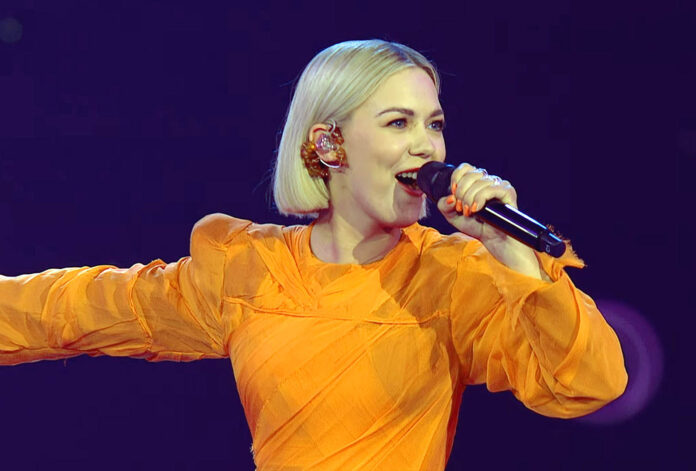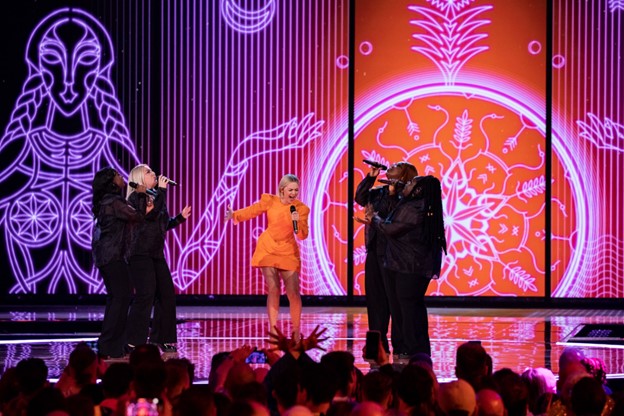
The famous Eurovision song contest finals took place in Liverpool, England on May 13. The winner of the 67th competition was Sweden’s Loreen, with her song “Tattoo”. She had also won first place in 2012 singing “Euphoria”. This year, Lithuanian Monika Linkytė placed 11th with her song “Stay“. For performance videos go to https://alkas.lt/2023/05/14/eurovizija-laimejo-svede-lorin-lietuve-monika-linkyte-liko-11-ta/.
Singers from 26 countries were vying for first place in the 2023 Eurovision competition: Austria, Portugal, Switzerland, Poland, Serbia, France, Cyprus, Spain, Sweden, Albania, Italy, Estonia, Finland, Czechia, Australia, Belgium, Armenia, Moldova, Ukraine, Norway, Germany, Lithuania, Israel, Slovenia, Croatia, and the United Kingdom.
 Comments on the website bernardinai.lt included the opinion that the famous competition is newly showing a certain amount of ethnicity. Organizers maintained Eurovision’s non-political policy and did not allow Ukraine’s president Volodymyr Zelenskyy to speak during the event, yet critics say that political sympathies do influence results. Viewers of the 2022 and 2023 contests in retrospect might think that the war in Ukraine had begun in 2023. Last year there were no references to the war at all. This year, five to seven performances referred to it directly or indirectly, for example: Croatia made it into the finals, with a clearly anti-war message; Swiss performers sang about many people not wanting war. It is quite likely that any issues of the day, from “Me too” to LGBTQ+, would appear as themes in current songs. Last year, Ukraine won the competition, and this year, the event was held in the UK, which clearly supports that country.
Comments on the website bernardinai.lt included the opinion that the famous competition is newly showing a certain amount of ethnicity. Organizers maintained Eurovision’s non-political policy and did not allow Ukraine’s president Volodymyr Zelenskyy to speak during the event, yet critics say that political sympathies do influence results. Viewers of the 2022 and 2023 contests in retrospect might think that the war in Ukraine had begun in 2023. Last year there were no references to the war at all. This year, five to seven performances referred to it directly or indirectly, for example: Croatia made it into the finals, with a clearly anti-war message; Swiss performers sang about many people not wanting war. It is quite likely that any issues of the day, from “Me too” to LGBTQ+, would appear as themes in current songs. Last year, Ukraine won the competition, and this year, the event was held in the UK, which clearly supports that country.
Founder and director of non-commercial music-oriented radio station LRT OPUS, Eurovision commentator Darius Užkuraitis was asked about his favourite performances, and he mentioned Spain first, saying it was worth seeing, because it had “a higher musical IQ”. He also liked Finland’s entry, as well as the French entry, a tribute to the traditional “chanson”. Užkuraitis felt that this year’s competition was not the strongest, saying that there were more standout songs in previous years. Regarding first-place winner Loreen, he noted that her performance was very professional, but too similar to the one she won with in 2012.
He also pointed out two new trends in the Eurovision lineup: the rebirth of “ethnomusic” and the use of national languages. Most performers chose their own languages instead of English, especially now that translations are readily available on the internet. Although Monika Linkytė’s song was in English, the refrain – Čiūto tūto – harks back to ancient Lithuania and resonates with Lithuanian souls. Her performance was enhanced by visuals from traditional folk art.
Ukrainians were the first to introduce ethnic elements in 2021, and others later followed suit.
Lithuanian Eurovision portal editor-in-chief Justas Buivydas notes that Swediss are stillthe kings and queens of European pop music. In his opinion, audiences may be looking for something new, but the Swedish standard is still very attractive to listeners.





























